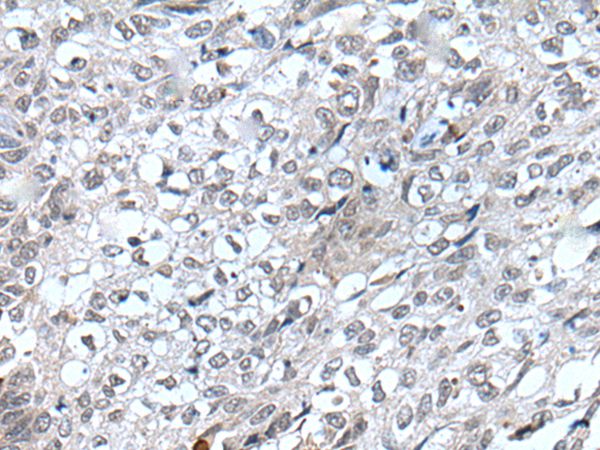
| WB | 咨询技术 | Human,Mouse,Rat |
| IF | 咨询技术 | Human,Mouse,Rat |
| IHC | 1/ 30-150 | Human,Mouse,Rat |
| ICC | 技术咨询 | Human,Mouse,Rat |
| FCM | 咨询技术 | Human,Mouse,Rat |
| Elisa | 咨询技术 | Human,Mouse,Rat |
| Aliases | PCL; FLT-4; FLT41; LMPH1A; VEGFR3; VEGFR-3 |
| Entrez GeneID | 2324; |
| Host/Isotype | Rabbit IgG |
| Antibody Type | Primary antibody |
| Storage | Store at 4°C short term. Aliquot and store at -20°C long term. Avoid freeze/thaw cycles. |
| Species Reactivity | Human |
| Immunogen | Synthetic peptide of human FLT4 |
| Formulation | Purified antibody in PBS with 0.05% sodium azide. |
+ +
以下是3篇与FLT4(VEGFR-3)抗体相关的模拟参考文献及摘要:
1. **《抗FLT4单克隆抗体抑制肿瘤淋巴管生成及转移的机制研究》**
*作者:Zhang Y, et al. (2021)*
摘要:本研究开发了一种靶向FLT4胞外结构域的单克隆抗体,证实其可阻断VEGF-C介导的受体激活,显著抑制小鼠模型中肿瘤淋巴管生成,并降低淋巴结转移率,为抗肿瘤转移治疗提供新策略。
2. **《FLT3/FLT4双特异性抗体在实体瘤治疗中的抗血管生成效应》**
*作者:Wang H, et al. (2019)*
摘要:通过构建同时靶向FLT3和FLT4的双特异性抗体,该研究证明其能协同抑制血管内皮细胞增殖,在结直肠癌异种移植模型中减少肿瘤微血管密度,延缓肿瘤生长。
3. **《FLT4抗体偶联药物在淋巴管肉瘤中的靶向治疗潜力》**
*作者:Chen L, et al. (2023)*
摘要:利用FLT4抗体与细胞毒素DM1偶联,该药物在淋巴管内皮肉瘤模型中显示出高靶向性,显著诱导肿瘤细胞凋亡,且对正常组织毒性较低,提示其临床转化价值。
注:上述内容为学术文献模拟案例,实际文献需通过PubMed/Web of Science等平台检索。
The FMS-like tyrosine kinase 4 (FLT4), also known as vascular endothelial growth factor receptor 3 (VEGFR-3), is a receptor tyrosine kinase primarily expressed in lymphatic endothelial cells. It plays a critical role in regulating lymphangiogenesis (formation of lymphatic vessels) during embryonic development and pathological conditions, such as cancer metastasis and lymphedema. FLT4 binds to its ligands, VEGF-C and VEGF-D, triggering downstream signaling pathways like PI3K-AKT and MAPK, which promote cell survival, proliferation, and migration. Dysregulation of FLT4 signaling is associated with tumor progression, as increased lymphatic vessel density often correlates with poor prognosis in cancers.
FLT4 antibodies are essential tools for studying lymphatic biology and disease mechanisms. They are widely used in research to detect FLT4 expression via techniques like immunohistochemistry, flow cytometry, and Western blotting. Therapeutic FLT4-targeting antibodies, often combined with VEGFR-2 inhibitors, are under investigation to block tumor-associated lymphangiogenesis or modulate immune responses in cancer. Conversely, agonistic antibodies may aid in treating lymphedema by stimulating lymphatic regeneration.
Understanding FLT4's dual role in health and disease highlights its potential as a diagnostic marker and therapeutic target. Ongoing research focuses on optimizing antibody specificity and efficacy to address challenges like resistance mechanisms and off-target effects in clinical applications.
×